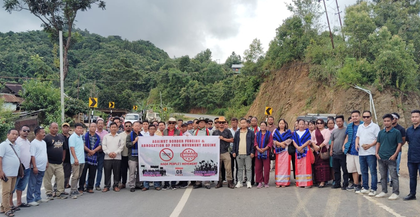Manipur: Naga bodies enforce ‘trade embargo’ against India-Myanmar border fencing, FMR scrapping
By IANS | Updated: September 9, 2025 18:00 IST2025-09-09T17:57:46+5:302025-09-09T18:00:11+5:30
Imphal, Sep 9 Manipur’s apex Naga organisation, United Naga Council (UNC), on Monday enforced a “trade embargo” in ...

Manipur: Naga bodies enforce ‘trade embargo’ against India-Myanmar border fencing, FMR scrapping
Imphal, Sep 9 Manipur’s apex Naga organisation, United Naga Council (UNC), on Monday enforced a “trade embargo” in all Naga people inhabited areas in protest against the fencing along the India-Myanmar border and the scrapping of the Free Movement Regime (FMR).
Police officials said activists of the UNC and other Naga organisations staged demonstrations and blockades at various points along the highways, including the Imphal-Dimapur National Highway (NH-2) and the Imphal-Jiribam National Highway (NH-37).
Leaders of Naga organisations claimed that they held the demonstrations and blockades in Senapati, Chandel, Ukhrul, Noney, and Tamenglong districts. A large number of goods-laden trucks were stranded in Senapati, Tamenglong and other districts.
The Naga community mostly inhabit Tamenglong, Chandel, Ukhrul, Kamjong, Noney and Senapati districts, which are along the Nagaland and Myanmar borders.
A UNC statement said that on the issues of unilateral abrogation of FMR and construction of border fencing amidst Naga homeland, the Naga people have placed their sentiments and position loud and clear on record to the government of India through official memorandum to the authorities followed by series of agitations, demonstrations, public rallies and press statements to the government in a democratic approach with all civility, since January 19, 2024.
The indifferent attitude of the government necessitated a stringent agitation to register the rigid stance of the Naga people against the scrapping of FMR and the erection of fencing along the India-Myanmar border for defending the Naga homeland and identity, and the inherent rights over land, the statement said.
The apex Naga body said that all the issues were discussed in the UNC’s Presidential Council Meeting held on August 11, 2025 and decided to impose a 'Trade Embargo' for an indefinite period in all the Naga people inhabited areas with effect from midnight of Monday (September 8).
Meanwhile, officials of the Ministry of Home Affairs (MHA) and leaders of three Naga groups in Manipur held an inconclusive meeting on August 26 over the demand for reinstatement of the old Free Movement Regime (FMR) and stoppage of the ongoing fencing along the India-Myanmar border.
The MHA official team was led by A. K. Mishra, advisor to the MHA on Northeast Affairs, while the 11-member Naga delegation was headed by UNC President Ng. Lorho and comprised representatives of the UNC, the All Naga Students' Association, Manipur (ANSAM), and the Naga Women's Union (NWU).
The UNC had previously issued an ultimatum to the Central government and held a meeting with Manipur Governor Ajay Kumar Bhalla on August 16, and discussed the reinstatement of the old FMR and the stoppage of border fencing along 398 km of the India-Myanmar border with Manipur.
The UNC and other Naga bodies have been agitating in support of their demands since last year, opposing the "unilateral abrogation of FMR and construction of border fencing along the India-Myanmar border".
Meanwhile, Nagaland Chief Minister Neiphiu Rio, in his Independence Day speech in Kohima, expressed his concern over the Centre’s decision to trim down the FMR along the India-Myanmar border from the earlier 16 km to 10 km and limit movement to nine crossing points. He had urged the Union government to be flexible and review the sensitive issue.
The MHA last year announced that the FMR, which earlier allowed people residing along the India-Myanmar border to travel 16 km into each other’s territory without a visa, would be scrapped.
Instead, it had decided to adopt a new scheme to issue a pass to the border residents of both India and Myanmar living within 10 km on either side of the frontier to regulate cross-border movements.
Participating in a discussion in the Nagaland Assembly earlier on the issues, the Chief Minister had told the house that the border movement restriction would affect the long-standing historical, ethnic, social, cultural, traditional and economic ties of Nagas living on both sides of the India-Myanmar border.
The Nagaland and Mizoram governments and a large number of political parties and civil societies in the two northeastern states have been opposing both border fencing and the scrapping of the old FMR.
Four northeastern states -- Arunachal Pradesh, Manipur, Nagaland, and Mizoram -- share a 1,643-km unfenced border with Myanmar.
The MHA had earlier decided to erect fencing on the entire porous border, known for the smuggling of arms, ammunition, narcotics and various other contrabands, for Rs 31,000 crore.
--IANS
sc/dan
Disclaimer: This post has been auto-published from an agency feed without any modifications to the text and has not been reviewed by an editor
Open in app